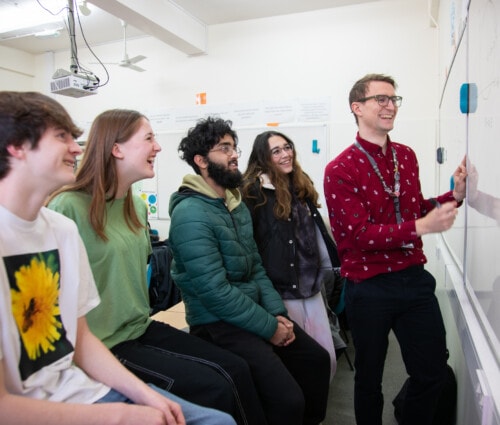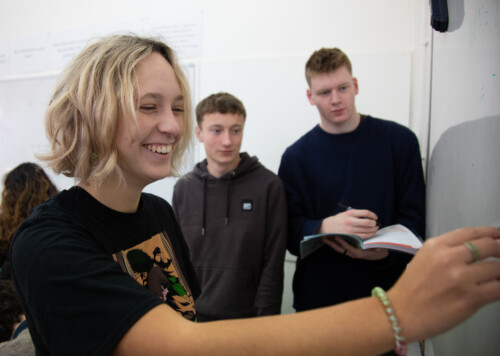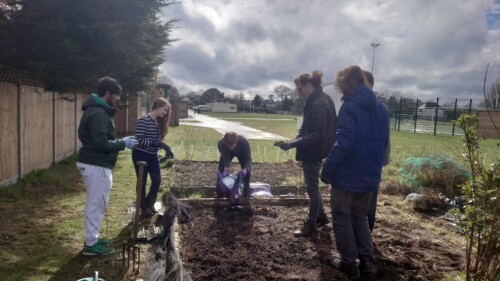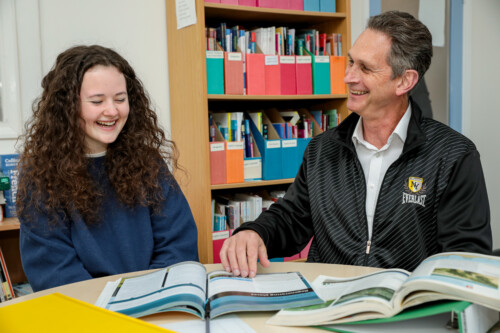Second Year – Progression Pathways
In the second year, you have an opportunity to choose a new Extension Studies course in the form of a Progression Pathway. This will replace your Complementary Study.
These courses are designed to complement students’ core academic courses, whilst also supporting their progression after Esher. They will do so by helping to develop knowledge and skills that are crucial to success at A level or BTEC, as well as enhancing their applications to university, apprenticeships or employment.

While it is a College requirement to add a Progression Pathway to your study programme, students continuing with 4 A Levels, the Duke of Edinburgh’s Award Scheme, a sports team or who have timetabled Learning Support do not need to add a pathway, these programmes continue in to the 6:2 year.
There are a range of Pathways to choose from that include qualifications, specialised career or performance development, as well as study skills support. Options currently available to students in 2023/24 in each of these areas are summarised below.
Qualifications
These Pathways enable students to gain an AS or other nationally recognised qualification in an area that complements and enhances one of the subjects on their core programme or, develops valuable skills that support personal development. The most popular of these courses currently is the AS Extended Project Qualification.
AS Further Maths

What is the course about?
An ideal course for students who want to study Maths, Physics, Engineering or other Maths-related courses at university. The course covers some Further Pure and Statistics content and also covers a new area of Maths called Decision Maths.
The course is taught over four lessons per week and the final assessment is by examination in the summer term.
Who should consider this option?
This course is for students who are already studying A Level Maths and who wish to extend their understanding of the subject. You will need to have achieved a B grade or higher at PR3 to be considered for this course
Core Maths

What is this course about?
- The course focuses on numerical, statistical, financial and problem-solving skills in maths, which will help you deal with the mathematical and statistical content in subjects such as Biology, Psychology, Economics, Business Studies and Geography.
- There is relatively little emphasis on algebra.
- You will work with familiar numerical skills such as percentages and decimals, and useful new ones like Fermi Estimations. You will also learn how to compute income tax, national insurance and different kinds of interest rates. The statistics content includes the Normal Distribution curve, correlation, regression and estimation.
- The course is excellent preparation for managing your own personal finances and good preparation for degrees that contain an element of statistics.
- The course is taught over two lessons per week and the final assessment will be by examination in the summer term.
Who should consider this option?
Students who enjoyed maths at GCSE and achieved a grade 5 or above, and would like another qualification in maths.
The course should not be taken by students who are also taking A Level Maths.
Extended Project Qualification (EPQ)

What is the course about?
The EPQ is an opportunity for you to carry out a research project in an area that interests you.
There are two ways to achieve an EPQ qualification:
- Write a 5,000 word report based on your research (EPS)
- Create an artefact (e.g. a fashion piece, a film, a song) and a written report based on your research (EPC)
With either option you must also document how your project develops in a logbook and give a presentation about your project. The Extended Project Qualification is highly regarded by Universities and completing the qualification will help you to develop your skills of planning, research, time management and self-reflection.
If you want to pursue a creative or performance related course/career pathway after College and want to build up a portfolio of work then you should enrol on the EPQ creative version of the course.
Who should consider this option?
If you are very keen to explore an area of interest in a subject further, or explore links between the subjects you study, then this is for you. You must have high degree of self-motivation, be able to work independently and be willing to carry out extensive research.
L2 Award in Introduction to Counselling

What is the course about?
You will learn how to establish helpful interactions with others and to use listening and helping skills safely and ethically. It will also help you to develop good interpersonal communication skills, as well as your self-confidence.
This course requires regular attendance, the keeping of a portfolio of evidence of learning and a skills-based assessment. Successful completion leads to a nationally recognised qualification.
Who should consider this course?
The qualification has been useful for students hoping to enter one of the caring professions or for volunteering for helplines and student support groups at university. University admissions officers hold it in high regard.
Higher Sports Leadership Award

What is the course about?
This course develops leadership skills, behaviours and experience through practical sport lessons and some theoretical tasks. To pass the course, you must find and complete 30 hours voluntary work within sport/physical activity outside of college, as well as attend the additional events organised by the College. It also gives you the opportunity to develop new skills and to work with specialist community groups, including people with disabilities.
Who should consider this option?
Ideal for students who wish to further develop their coaching skills or are considering careers such as teaching and sports development.
Geographical Information Systems

What is this course about?
Ever wondered how big retailers decide where to locate their next store or how the NHS decides where to open up a new hospital? The answer is Geographic Information Systems!
This course is an opportunity for you to learn how to manipulate and analyse a Geographic Information System called ArcGIS. Hundreds of thousands of organisations around the world, in virtually every field of work, are using GIS to make maps that communicate information, analyse data and solve complex problems. It analyses spatial location and organises layers of information into clear images, using maps and 3D scenes.
Certificates available through the course:
- ESRI Microsoft: Getting Started with 3D Maps and Data in ArcGIS
- Mapping and visualisation web course
- ArcGIS Pro basics (working with charts and reports and performing hydrological analysis in ArcGIS Pro)
Who should consider this option?
This option is open to all students however, it is ideal for students who are considering studying a Geography-related course at university or taking a Geography-related apprenticeship.
In addition, if you are taking other A Levels but are considering working in government, healthcare, business, manufacturing, real estate, public safety, sustainability, telecommunications, water management, hazard management, or insurance as an apprentice or after university, then this course will give you skills and knowledge to transfer to that workplace.
L3 Certificate in Speaking in Public (LAMDA)

What is the course about?
Are you daunted by the thought of speaking in public but may want to work in a career that may require you to do so? Does the prospect of presenting confidently at interview fill you with dread? Then this course might be just what you are looking for…
LAMDA’s Speaking in Public qualification can give you the skills and knowledge to present confidently and effectively to a range of audiences. You will research topics of interest, write your own speeches, create visual aids for them and present from memory.
We will be offering the course at Grade 8 (UCAS points can be gained depending on how you perform.)
To gain your certificate you must do the following:
- Deliver one prepared speech on a set subject for four minutes
- Deliver one prepared speech on an own choice subject for four minutes
- Prepare and deliver one impromptu speech for three minutes on a set topic, which you will be given on the exam day and have 15 minutes to prepare for
- Answer questions related to the speeches and technical terminology.
Who is this option for?
This is a great course for anyone thinking of going into any university course or career where presenting to an audience is required- think seminars, conferences, sales pitches. Alternatively, you can do it just to build your self-confidence.
Gold Crest Award

What is the course about?
This course is ideal for scientists who want to gain some hands-on practical experience and achieve a nationally recognised CREST award. You will work in small groups to choose your own topic, then develop your methodology and ultimately complete your own investigation.
You will develop a wide range of skills including project management, communication skills, team building skills, technical skills and research skills.
Who should consider this option?
Students who want to develop and deliver a self-directed project and get an Award at the end. Also, those students who are interested in practical investigations, communication, teamwork and/or academic research.
It is also suitable for those students with a science background but who struggle with extended writing.
It is also suitable for students who are likely to go on to an apprenticeship or a job where they will be required to work independently on projects.
Climate Action, Sustainability and the Environment

What is the course about?
Climate change and environmental sustainability is at the top of the political, economic and social agenda locally, nationally and globally. It is something that affects all of us.
In this course, students will study the Carbon Literacy Award in the first term and gain accreditation. The Award is nationally recognised and includes topics as diverse as greenhouse gases, carbon footprints and moving towards net zero. Students also devise and carry out a local action project.
In the second term, students will be developing a tool to audit and map environmental sustainability provision in the curriculum. They will develop resources to inspire and motivate students and staff to bring this important topic into their work.
Students will gain analytical skills, communication skills and technical skills.
Who should consider this option?
Students who are passionate about climate change and environmental sustainability and those who wish to develop their knowledge and understanding in this area.
Students who are likely to go on to university to study a degree in this field and/or for whom this area might be part of their career. For example, those interested in working in environmental science, green energy, carbon analytics and accounting, risk and hazard management.
Specialised Career Development
These specialised career development pathways are designed for students who have a focussed idea about their progression post Esher, whether that be on to an Art Foundation Course, a specialist music Course, drama school, a high-performing university or in to employment or an apprenticeship. All students who take one of these pathways are given individual help to support them in applying for such routes.
Creative Arts Portfolio

What is this course about?
This course is designed to offer guidance in portfolio preparation and to support your application and progression to either an Art Foundation course, specialist degree course or employment.
As well as exploring a range of processes and techniques to produce individual focus in your work, you will develop portfolio presentation methods to meet the application requirements. As well as developing your portfolio, you will gain support in making applications and interview preparation.
Who should consider this option?
This course is ideal for students who take Fine Art, BTEC Subsidiary Diploma in Art & Design, 3D Design, Photography, Fashion, Media Studies or Graphic Communication and wish to broaden and prepare a portfolio to support their application.
Students who take non-creative A Level subjects, but have realised their potential and interest during their time at college and now wish to apply for an Art Foundation course would greatly benefit from this pathway and from having the support of a ‘creative’ mentor in their second year.
Specialist Music Pathway

What is the course about?
This course is designed to help students prepare a portfolio of music to support progression to a Music or Music Production/Technology based degree course, employment or music apprenticeship.
Lessons will cover digital distribution, and preparation of a portfolio.
Skills required and developed might include recording, production, mixing, sampling and mastering, as well as performance, if required. You will be encouraged to develop a personal and individual focus to your music production work portfolio, or audition preparation, as well as to explore a wider depth in the processes and techniques you use.
You will be able to develop your own social media platforms and learn about marketing your own music. You will be given help with developing your online presence, and gain tips and improvements for your CV writing and applications for jobs, university courses and work experience.
Who should consider this option?
Ideal for students who take Music A Level or Music Production BTEC, who want to go on to a career in the Music Industry. BTEC Media students with some musical interest or experience are also welcome.
Creative students who are interested in studying a creative music production course, and musicians who are not studying Music A Level or Music Production BTEC but are interested in further Music study or working in the Music Industry following sixth form, may also be interested in taking this course.
Career Development

What is this course about?
This course is designed to help students develop further employability skills and experience, in preparation for employment, internships or further training such as apprenticeships.
The course will offer guidance on the application process, including information on what skills employers are looking for, how to develop and evidence these skills, how to build a strong CV, how to network and curate an online portfolio.
During the course, students will also develop key skills in communication and interviewing which will prepare them for assessment centres and job interviews.
Who should consider this option?
This course is relevant for students who intend to enter employment or an apprenticeship after Esher and will select the ‘Employment’ route for After Esher Day, or for those who are intending to go on to university but who wish to bolster their employability skills.
Performance-related Progression Pathways
Creative departments within the College offer students the opportunity to develop and achieve high standards of performance in areas such as sport, drama and music through playing for the College sports teams or taking part in College drama and musical performances. A student doesn’t have to be studying these subjects for A Level or BTEC to take part, but needs to be committed to improving their practical talents as well as working as part of a team.
Theatre Workshop

You should only choose this or College Production if you are taking Drama and Theatre Studies A Level or BTEC Performing Arts or were involved in College Production in 6.1.
What is the course about?
Theatre Workshop is a focused on acting and developing performance skills. 6.2 students will support and direct 6.1 students, taking on roles of responsibility, e.g. directors, stage managers and, if relevant, theatre technicians. Students will then be selected to fulfil the leadership roles available, as appropriate.
This course offers the opportunity to collaborate creatively with other students, gain directing and production team experience, as well as developing skills in leadership, communication and problem solving.
There are two timetabled sessions a week. There is the potential for a showcase of final pieces to an invited audience.
Who should consider this option?
This pathway is only open to Drama & Theatre or BTEC Performing Arts students or those who have been involved in the Theatre Workshop or College Production last year.
College Production

You should only choose this or College Production if you are taking Drama and Theatre Studies A Level or BTEC Performing Arts or were involved in College Production in 6.1.
What is this course about?
The College Production is a production of a play, usually with some dance and music involved too. 6:2 students will support and direct or choreograph 6:1 students, taking on roles of responsibility within the company e.g. directors, choreographers, stage managers and theatre technicians.
This course offers the opportunity to creatively collaborate with other students, gain directing and production team experience, as well as developing skills in leadership, communication and problem solving. Students will then be selected to fulfil the leadership roles available, as appropriate.
Who should consider this option?
This option is open to Drama and Theatre and BTEC Performing Arts students or those who have been involved in the College Production last year.
It is ideal for students applying to Drama School or a Drama/Theatre related degree at University. There are two timetabled sessions a week, plus additional rehearsals after college and at weekends. The final performances are also after College hours.
To ensure a high standard of production we expect 100% attendance and commitment.
Drama Audition Workshop

What is the course about?
This is for students who wish to prepare for Drama school or plan to study Drama at university. You will perform theatrical pieces either on your own or in pairs. You will perform both Shakespeare and contemporary monologues.
Who should consider this course?
This option is open to Drama and Theatre or BTEC Performing Arts students applying to Drama School or Drama at university.
Study Skills Support
We also offer Pathways for students who would like some further support in accessing and developing higher level skills to improve their academic performance in their core subjects. Students are in smaller classes and have an allocated mentor who works with them to support their academic development.
Academic Mentoring

What is this course about?
This course is designed to help students who have not performed at their potential in 6:1, including in the Progression/end of year exam to achieve greater success in 6:2. It may be that you haven’t really adjusted to more independent ways of working, after a disrupted lockdown learning experience, or you just find the leap from GCSE really challenging. You will be allocated a mentor will help you develop strategies in areas such as:
- prioritising and managing deadlines
- motivating yourself to getting down to studying properly – that means using those all important private study periods to save you time to do the other things you want to do
- techniques for getting material learned for exams
- keeping going when you find things difficult
- improving your organisation
- becoming more confident on where to go for help with your core subjects.
We will support and guide you to become a more effective student overall – to get better grades and to make you better prepared for university, employment or an apprenticeship. This course works best if you also liaise with your subject teachers where you have underachieved, to really begin to understand the specific things you need to work on to improve. This information will help your mentor help you more effectively.
Who is this option for?
This course is for students who have not performed to their potential in 6:1. You will automatically be enrolled onto this course so we can help you to strengthen your approach in your 6:2 year.
Study Skills for Success

What is this course about?
Do you get disheartened when your grades keep coming back the same? Was your last Progress Review not what you had hoped for? Do you want to find ways to become more of an independent learner and improve and polish your work, so that you achieve to the best of your ability? Do you want to learn some skills that will help you manage your work and time, not just at college but in life? This course is ideal if you would like to develop higher level skills and improve your academic performance, particularly in one or two subject areas. A study skills mentor will be allocated to you, and their job will be to help you identify areas for improvement and help you to progress as an individual. You will be encouraged to self-reflect and identify the changes that you can make to the way you study, and approach your
assessment.
Areas covered on the course will include:
- how to be more self-motivated and resilient;
- how to manage time effectively;
- how to apply different methods of independent learning;
- effective revision methods;
- giving presentations and presenting work effectively;
- essay planning;
- researching effectively;
- reading to extract relevant information;
- question analysis;
- questioning;
- critical thinking;
- debating;
- and writing effectively (including some refreshers on punctuation and grammar).
You will also develop the ability to better use the feedback you are given by teachers, so that you take more control of your work and your results. Sessions will include tips and guidance, one to ones with your mentor and some time to work on assignments that you are finding particularly challenging. To get the most out of these sessions, it will be important to talk to your subject teachers about what you specifically need to work on: you can then share with your mentor.
Who should consider this option?
This pathway is designed for students who feel they have underperformed in their 6:1 year and aspire to improve on their 6:1 performance. It is also ideal for students who have found the transition from GCSE to A Level more difficult than they expected, or struggled to get motivated during lockdown and feel that they want to get into good study habits. It is also for those who would like additional support to access higher level skills for success. Students studying BTEC or A Level courses who struggle to meet deadlines or balance their workload would also find this pathway beneficial.